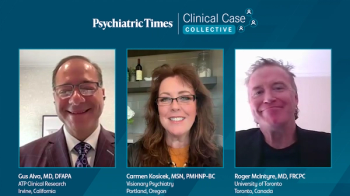Expanding Possibilities in MDD: Exploring Rapid-Acting Therapeutic Options

Gus Alva, MD, DFAPA, introduces his esteemed colleagues and leads a comprehensive discussion on the complexities of managing major depressive disorder. The conversation addresses the rising prevalence of MDD, the enduring stigma surrounding the condition, and its profound impact on patient quality of life.

Experts in the management of mood disorders comment on the evolving management of major depressive disorder, emphasizing findings from the STAR*D trial, updated treatment guidelines, and the role of precision medicine and the shift toward personalized, rapid-acting treatments to improve patient outcomes.

A panel of depressive disorder experts examines the need for updated APA treatment guidelines related to major depressive disorder, highlighting the roles of pharmacotherapy, psychotherapy, and combination therapy based on severity.

Gus Alva, MD, DFAPA; Carmen Kosicek, MSN, PMHNP-BC; and Roger McIntyre, MD, FRCPC, focus on social determinants of health and MDD commenting on treatment augmentation, and integrative approaches like social prescribing.

A patient suffering from MDD, shares his story and the rapid benefits of patient experience with NMDA-targeted therapy, commenting on the tremendous quality of life benefit.

Experts in the management of mood disorders comment on how to assess and quantify treatment response in MDD, focusing on effective measurement strategies to guide clinical decisions

Carmen Kosicek, MSN, PMHNP-BC shares her insights into insurance coverage, the role of specialty pharmacies, and patient advocacy efforts to improve access to novel MDD therapies.

Experts in the management of depression provide insights into understanding medication mechanisms, assessing when treatments are effective, and navigating therapy adjustments to optimize outcomes and complement various MOAs

Experts in affective disorders discuss the pathophysiology, genetic components, and neurocircuitry involved in these conditions. They delve into treatment nomenclature and patient conversations, focusing on how to target specific brain areas, assess responses, and manage treatments to improve quality of life and hedonic tone

Gus Alva, MD, DFAPA presents the case of a patient with recurrent MDD, and the panel explores treatment approaches, comments on the condition triggers, and challenges in managing persistent depression.

Experts in the management of mood disorders discuss the challenges of treatment failure and achieving symptomatic remission in MDD. They examine the efficacy of antidepressant and rapid-acting treatments, offering insights into evaluating and enhancing treatment outcomes.

Gus Alva, MD, DFAPA; Carmen Kosicek, MSN, PMHNP-BC; and Roger McIntyre, MD, FRCPC delve into FDA-approved rapid-acting treatments for MDD and TRD, focusing on the sigma-1 agonist and its pharmacodynamics. They explore treatment indications, the rapid onset of action, and how these innovations address unmet clinical needs and shift the treatment paradigm for newly diagnosed depression

Experts in the management of depression discuss managing unsatisfactory responses in chronic MDD, focusing on anhedonia and its role in disability. They explore strategies to improve treatment outcomes and address the persistent challenges faced by patients with chronic depressive symptoms.

A panel of mood disorder experts explore the challenges of treatment-resistant depression (TRD), including defining TRD, managing partial improvement, and addressing adverse reactions. They discuss the role of glutamate in TRD, efficacy and safety considerations from clinical trials, treatment half-life, and real-world experiences with pharmacovigilance.

Gus Alva, MD, DFAPA; Carmen Kosicek, MSN, PMHNP-BC; and Roger McIntyre, MD, FRCPC wrap up the conversation discussing optimizing treatment response with a focus on rapid-acting antidepressants (ADTs), including real-world patient responses and clinical study data. They address patient education, treatment expectations, titration, and follow-up strategies to enhance treatment optimization and outcomes.

